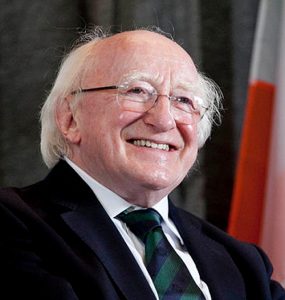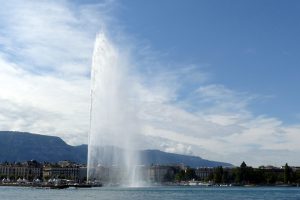
By Cian Molloy - 11 June, 2018

President Michael D. Higgins
There can be no social justice that is not unlimited, no peace that is not universal and no solidarity that is not open to all, President Michael D Higgins declared at the World of Work Summit in Geneva.
The President of Ireland was addressing the 107th Session of the International Labour Organisation (ILO), which was founded in 1919 as an agency of the League of Nations and is now a United Nations agency.
“Of all the institutions established by the international community in the wake of that cataclysm that was the First World War, only one has endured to this day – the International Labour Organisation,” President Higgins reminded delegates.
“That it has done so is testament to the moral vision and indomitable hope that is contained within the preamble to the constitution of the Organisation, that ‘universal and lasting peace can be established only if it is based upon social justice’. In our present circumstances, 99 years after that constitution was first proclaimed, that spirit of idealism and of vital moral purpose is more urgently required than ever.”
Notably, in 1923, the ILO was the first international organisation that the newly independent Irish state joined. Following the Second World War, an Irish civil servant, Edward Phelan, played a major role in drafting the ILO’s 1944 Declaration of Philadelphia which put human rights at the centre of social policy and advocated international economic planning. The declaration’s best-known principle is: “Poverty anywhere constitutes a danger to prosperity everywhere.”
Last year, the ILO passed a recommendation on Employment and Decent Work for Peace and Resilience, which has updated the Declaration of Philadelphia and put the creation of employment at the heart of humanitarian relief. The recommendation states: “Full, productive, freely chosen employment and decent work are vital to promoting peace, preventing crisis situations arising from conflicts and disasters, enabling recovery and building resilience”. Moreover, it offers guidelines on how to generate employment and decent work in crisis situations.
“In these first decades of the 21st century, we again live in a world marked by war and the rumour of war,” said the Irish president. “The burdens of war – famine, atrocity, starvation, displacement, forced migrations – now fall ever more upon those least able to bear them, upon women, children, and older people.”
Indeed, the task today may be more difficult than it was a century ago. “Inequalities in wealth, income and power – both a cause and consequence of war – are widening, both between and within nations, excluding hundreds of millions on the basis of the intersecting lines of class, nationality, ethnicity and gender,” said President Higgins.
“The unprecedented accumulation of greenhouse gases in the earth’s atmosphere, the legacy of two centuries of industrial civilisation, now threatens a planet most vulnerable to, and as yet unprepared for, the catastrophic consequences of climate change, with all of the devastating implications for the displacement of people, involuntary migration, the degradation of the environment and the eruption of new conflicts over diminishing natural resources.

Geneva, where President Higgins addressed the World of Work Conference
“Yet, at the very same time as we hold, as an international community, within our collective grasp the capacity to organise our labour within a framework of irreducible and indivisible dignity of work, whether by hand or brain, and when our resources, whether material or intellectual, to abolish all forms of human poverty exist and could ensure that, in the words of Declaration of Philadelphia, ‘all human beings, irrespective of race, creed or sex, have the right to pursue both their material well-being and their spiritual development in conditions of freedom and dignity, of economic security and equal opportunity’, we are drifting to failure.
“In affirming that principle I have quoted, we the members of the International Labour Organisation accept a moral, political, social and economic responsibility not only to the peoples of our own nations, but to the peoples of other nations, for there can be no social justice that is not unlimited, no peace that is not universal, and no solidarity that is not open to all.”
The former President of the Labour Party concluded: “Let us heed once again the lesson of a century ago that peace does not simply rest on common markets, come as residue or facilitating condition to the markets, but upon a global solidarity, intellectually powerful, built on adequate literacy of the economic and the fiscal, one dedicated to the realisation of social justice and equality for all our peoples, equality in all its forms, gender equality, economic equality, social equality, and equality of opportunity.
“That is how peace will be built and maintained in this century, a century that must, in new and ever-changing conditions, craft the experience of work within a sustainable, ethical global citizenship,” President Higgins said.